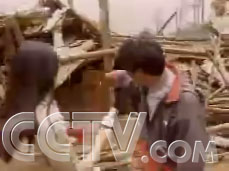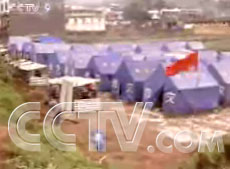 A strong earthquake measuring 6.2 on the Richter Scale struck Dayao County in Southwest China’s Yunnan Province at 11:16 PM on Monday night. Many aftershocks have been recorded. The epicenter was located in Tanhua Village in the middle of Dayao County. Fourteen towns and villages in Dayao County and another fifteen neighboring counties were affected by the temblor. One hundred and ninety thousand people were involved. A strong earthquake measuring 6.2 on the Richter Scale struck Dayao County in Southwest China’s Yunnan Province at 11:16 PM on Monday night. Many aftershocks have been recorded. The epicenter was located in Tanhua Village in the middle of Dayao County. Fourteen towns and villages in Dayao County and another fifteen neighboring counties were affected by the temblor. One hundred and ninety thousand people were involved.
As is usual when there are dangers or difficulties, servicemen are often the first to rush to the scene. Hours after the quake, these army men from the provincial army command post arrived at the quake area and got busy with rescue work. They were setting up tents for the victims as temporary homes.
“We arrived at the epicenter in Tanhua Village at two p.m. on July 22. We engaged in three tasks soon after our arrival: setting up tents for the people, delivering relief materials and eliminating possible dangers,” said Zhang Canjun, military officer of Yunnan Province.
Most people in the village lived in mud-brick houses. These houses could not withstand the temblor. Compared with the mud-brick houses, the best building in the village was this primary school, but even this school didn’t escape the disaster. One hundred and twelve classrooms in 69 schools were ruined and over 800 damaged. It’s the summer holiday now and the students don’t have to attend classes. But children may not have classrooms once the new semester begins. The local government launched into rescue work immediately when the sudden quake occurred.
“What did you do the first thing when you learned of the quake?”
“I informed the local leadership and other officials and staff to find out how the affected people were and what the whole situation was,” said Mao Qinglin, local official.
Soon after the quake was reported, the State Seismological Bureau quickly set out to observe the situation.
 Li Hanbai, vice governor of Yunnan Province, soon led an inspection team to the quake area. Officials from the State Seismological Bureau and related departments in Yunnan Province also arrived at the scene. Small roads leading to the mountainous village were blocked and posed even more difficulties to the disaster-relief efforts.
Li Hanbai, vice governor of Yunnan Province, soon led an inspection team to the quake area. Officials from the State Seismological Bureau and related departments in Yunnan Province also arrived at the scene. Small roads leading to the mountainous village were blocked and posed even more difficulties to the disaster-relief efforts.
“The biggest difficulty this time is the interruption of transportation. The severely hit area is located in a remote area and because of the road blockages, the quake stricken area has had to face additional grave difficulties. The delivery of relief materials and information exchange are badly affected,” said Na Yunde, magistrate of Dadao County of Yunnan Province.
Treacherous road conditions in the rugged mountains have meant that people have had to use horses to take tents and clothing in to the quake victims. This rescue worker is on his way sending tents on horseback.
Departments concerned are busying fixing damaged roads and trying to make use of all available transport means to send in relief materials around the clock. The victims are also helping themselves.
Self-made makeshift tents like these are scattered everywhere. The victims are mostly sheltered. But many have to squeeze together in one tent due to the scarcity of the tents. And the self-made tents are hardly strong enough. Providing enough shelter for the people is one urgent problem. In addition to providing shelter, food and medicine supplies also appear to be adequate.
Aftershocks are a big problem in the quake-stricken area.
“Earthquakes in this area are usually accompanied by aftershocks, a major temblor followed by a series of aftershocks. But aftershocks are usually less destructive than the major one,” said Chen Jianmin, vice director of China Seismological Bureau.
After the major temblor on 21, hundreds of aftershocks followed. Avoiding new losses is also an important problem in the rescue efforts.
“We have evacuated all the people living in dangerous houses. And some of the dangerous houses were pushed over in case people were injured when the houses collapse. In addition, we are ready with goods and other aspects so that if aftershocks occur or the disaster worsens, we are prepared,” said Yang Yi, local official of Yunnan Province.
The victimized villagers are carrying on with their life in temporary shelters. Rescue work is still going on to minimize the losses of people’s lives and property, and relief goods and funds are coming from the government and people from across the country. Everything is in order for these people to resume their normal life.
|